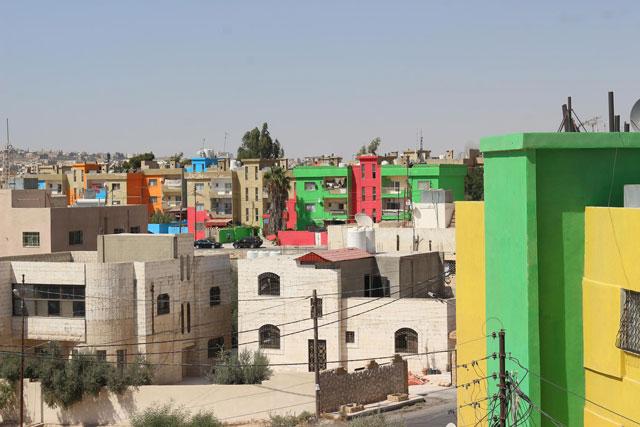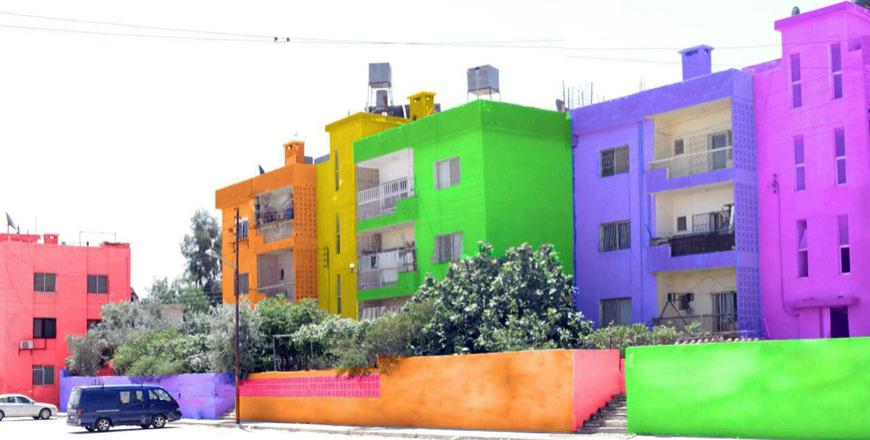You are here
Desert town undergoes physical, mental makeover, becomes ‘sensible, clean and fresh’
By Raed Omari - Aug 23,2016 - Last updated at Aug 23,2016

A project to beautify the industrial desert town of Sahab is in process to change its image as an ‘ugly’ city (Photo by Osama Aqarbeh)
SAHAB/AMMAN — Although "unfortunately" still judged with long-held "misconceptions", Sahab is being transformed into a modern, aesthetically attractive, environment-friendly and human rights sensitive city.
But that is only a small part of the makeover. The more significant transformation is in the mentality of the residents, especially the younger generation, thanks to the leadership shown by the town’s municipal council, which believes in “learning by example”.
Recently, the Sahab Club’s football team played a match in Amman. As the final whistle was blown, Mayor Abbas Maharmeh, and his colleagues, started cleaning the stadium. When the young crowd realised what was happening, all joined and left the facility clean, and fed the social media with a story to talk about and admire.
This new image is just the opposite of the stereotypes, which the mayor summed up in associating his town of 150,000 with being the house of Amman’s largest cemetery, pollution and to a certain degree, crime and violence.
A short walk in the industrial town, 20km east of Amman, one can clearly notice the difference made when leaders have vision and consistent efforts to realise it.
Maharmeh, who was elected as mayor in 2013, attracted the attention when he first appeared in the media sweeping streets with municipal workers, dressed in orange.
But to him the first achievement was "completing the administrative disengagement with the Greater Amman Municipality [GAM]".
"Over a period of eight years, GAM had gathered a lot of municipal tax money from Sahab citizens but did no development on the ground," Maharmeh said, adding that he and the other municipal council members have "inherited a bankrupt and indebted municipality".
"In the beginning, we had to spend from our pockets to run daily municipal affairs," the mayor said in an interview with The Jordan Times at his office on Saturday
"We accepted the challenge," Maharmeh, a retired police officer, said, adding that he and the municipal council members agreed to move ahead "fully convinced that will and determination were more important than money".
Their action plan centred primarily on restoring citizens’ trust in the municipality through fieldwork, day-to-day activities and projects of tangible outcomes and benefits.
On engagement with the local community, Maharmeh added that the municipality has sponsored 105 youth initiatives for change that “all have been transformed into projects on the ground.”
“Sahab young people now love their city and are proud of themselves. This is a big achievement.”
To enhance communication with the local community in Sahab, Maharmeh also said that a specialised team within the municipality is “working 24/7 using social media networks to register citizens’ notes, demands and complaints.”
“Another follow-up team is making sure that all demands are met,” Maharmeh added.
“My mobile number, WhatsApp and Facebook page are open and accessible to all residents, including children,” he said, adding: “Everyday there is an initiative submitted to the municipality and everyday there is a project implemented.”
Sahab placed first in the Kingdom in a study conducted by the National Democratic Institute on municipalities’ communication and interaction with the local community, he noted.With the backing of the people, the municipality went ahead to address the city’s woes.
Environment
With the country’s two major industrial zones operating in the desert city, Maharmeh said that the municipality has implemented a set of projects seeking to reduce pollution in Sahab including green energy and waste management.
Funded by the EU, a solar energy project in Sahab has been implemented to generate electricity for the city’s stadium, major schools, mosques and the municipality. The project will be launched this week.
The sewage system in Sahab has been upgraded and is now operating effectively “even during times of heavy rain”, according to the official, who accompanied The Jordan Times for a tour of the town.
“The municipality removes a total of 130 tonnes of trash from the city on daily basis. The amount is on the rise with the increase in population due to Syrian refugees influx,” he added.
Aesthetics
Under “Sahab is the world’s most beautiful city” initiative, the municipality is implementing a set of projects seeking to add beauty and glamour to the city.
Haitham Al Jaber, the municipality’s visual artist in charge of the beautification project, told The Jordan Times that they have a short-term plan to place Sahab as one the world’s most beautiful cities. How?
He said that a number of mega artistic projects, some of them are already in place, will be exclusively a “Sahab trade mark” to gradually enter the Guinness World Records.
“We erected in Sahab’s centre the world’s largest “mabkhara” [censer] and the largest mosaic tile picture in the Kingdom of His Majesty King Abdullah,” Jaber said, adding that the municipality will also build other iconic structures including the largest lantern in the world, the tallest obelisk in the Arab World, an Islamic museum and the Sahab Gate.
Colouring the city’s houses, shops, schools and walls, according to Jaber, is the major beautification project the municipality has already embarked on with the aim of making Sahab “just different and beautiful”.
“When I first came up with the idea of colouring the city, people, including my friends, said I am insane but when they saw the results, they all now come to the municipality asking to have their houses and shops painted,” Jaber said.
In addition, the municipality is determined to plant 100,000 trees in the city and its outskirts, said Maharmeh, adding that 5,000 trees of different types have already been planted. “It is in part meant to reduce pollution and gas emissions and add beauty to the city.”
‘Sahab fans’
A total of 500 citizens from Sahab have gathered in a group they called “Sahab fans” with one direct aim: supporting the municipality’s efforts and suggesting new ideas to improve and beautify their city.
Maharmeh said that “Sahab fans” came up with the idea of rehabilitating poor people’s houses instead of just giving them food parcels as it is the case in other parts of the country.
“These fans give free-of-charge language and computer courses to the citizens of Sahab. They also formed rescue teams to help people during blizzards and difficult weather conditions.
Testimonies
During interviews with The Jordan Times, people in Sahab commended their municipality’s efforts and projects, saying they now love living in Sahab.
“I feel now that my belonging to Sahab is stronger than any time ever,” said Laith Edeinat, a director, adding:” As a film director and a man of art, I am more encouraged now to contribute to Sahab and be a better citizen.”
“The biggest achievement for the municipality is to see art everywhere in the city,” Edeinat added.
For Khaled Abu Zeid, “Sahab Municipality is really now from the people and for the people.”
“Sahab was crowded, dirty, polluted and not safe, but now it is sensible, clean, young and fresh,” Abu Zeid, an owner of a home appliances shop said.
Related Articles
AMMAN — Sahab municipality seeks to put the southern Amman town on the map as one of the most beautiful cities in the world, its mayor Abbas
AMMAN — The embassy of Switzerland in Amman and the Municipality of Sahab on Wednesday signed a Memorandum of Understanding and Project Impl
AMMAN — The mayor of Sahab has asked the government to relocate an industrial zone which he says is damaging the town’s environment and affe

















